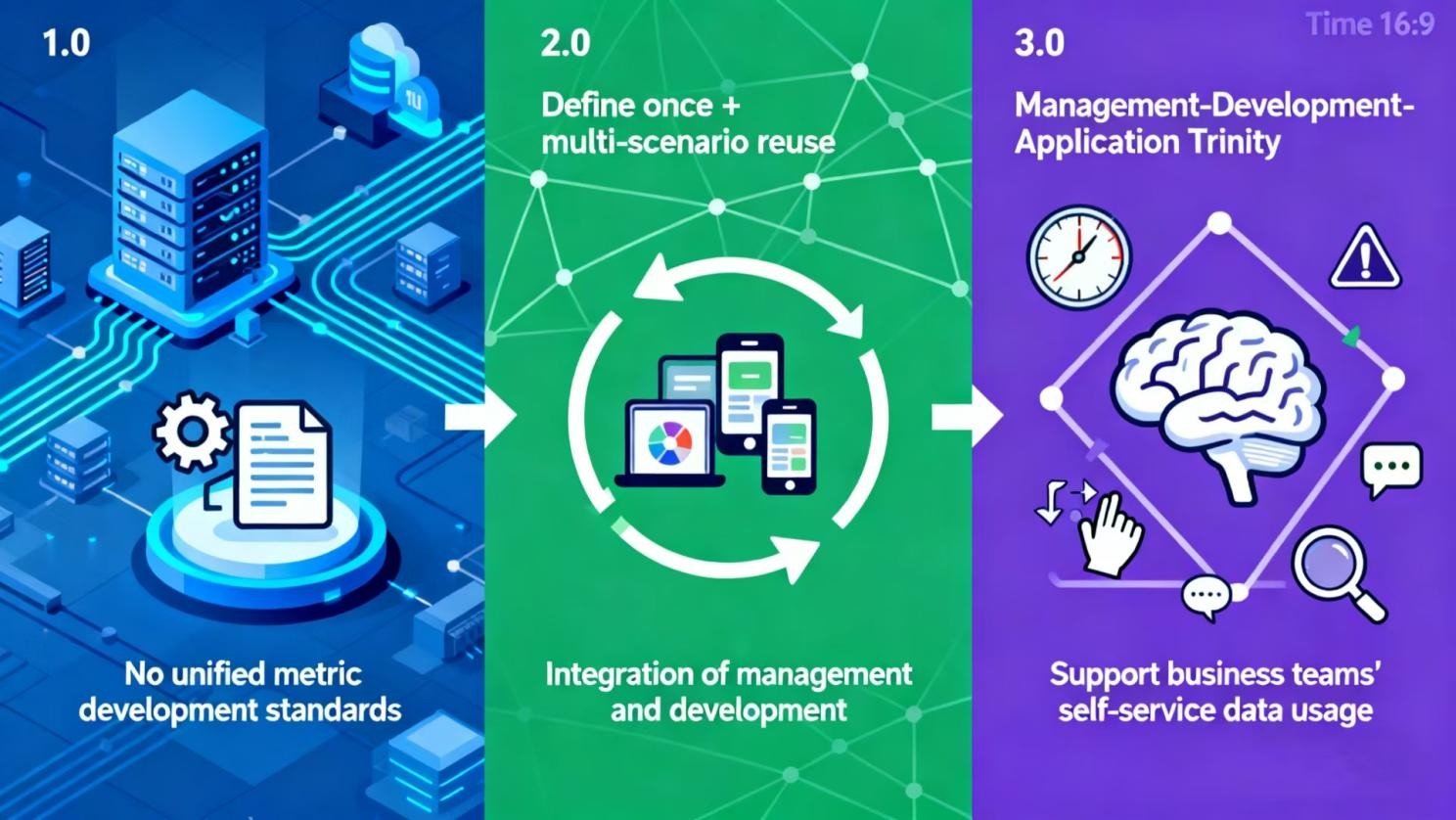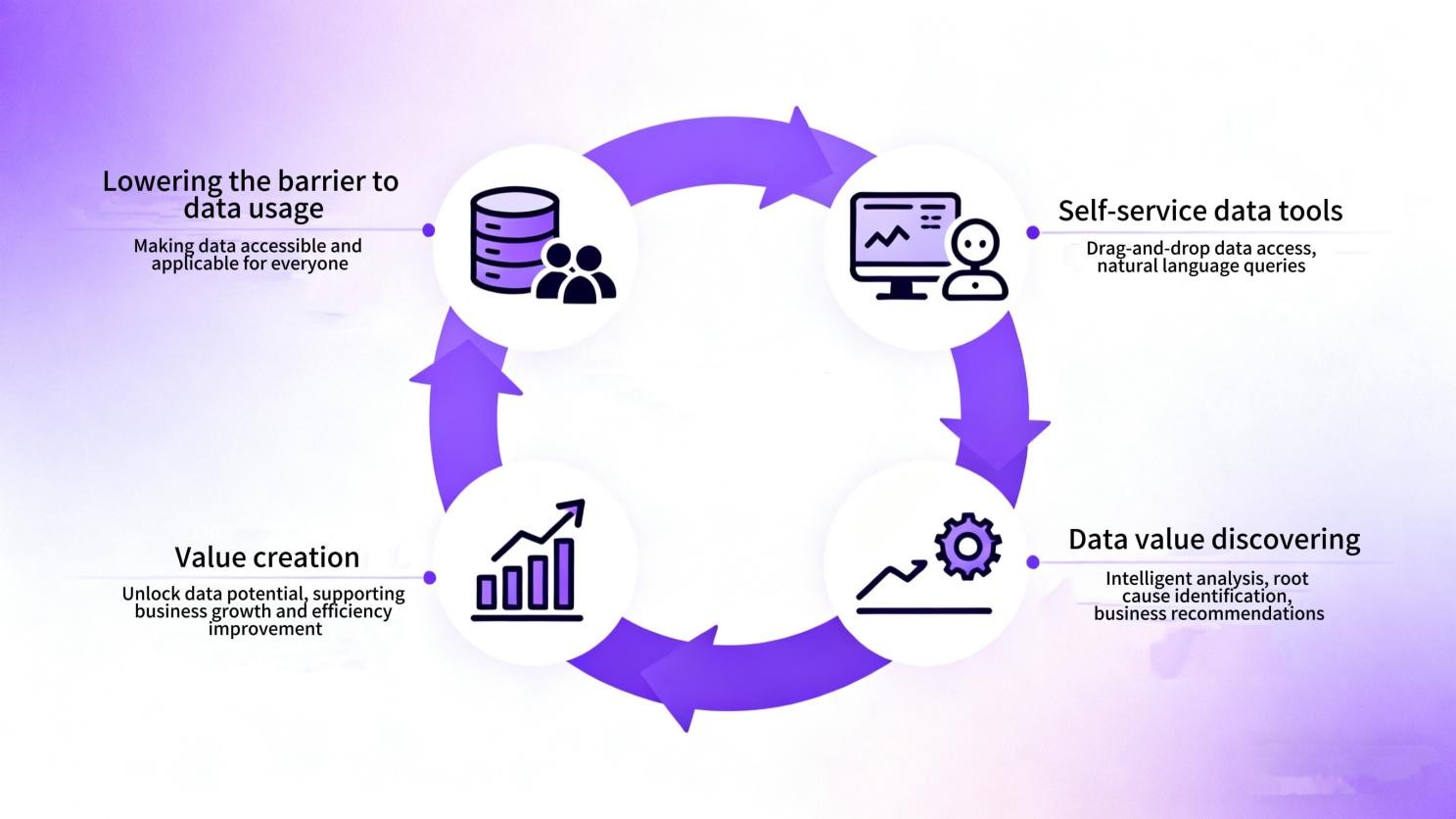Entering the Era of Intelligence: Ada.im Launches Large Model-Driven Metrics Platform
Keywords: Metrics Platform, Large Model-Driven, Data Democratization, Intelligent Analytics, Hyper Metrics Engine
Executive summary
Ada.im has officially released its next-generation, large model-driven metrics platform, representing a major step into the "Indicator Platform 3.0" era. The unified system integrates management, development, and application to make data dramatically easier for business teams to use.
- High performance: Millisecond-level queries on large datasets
- Automation: One-click integration, lineage, versioning, and pre-computation
- Intelligence: Natural language queries and automated reporting via a smart assistant
By combining NL2MQL (Natural Language to Metric Query Language) with intelligent agent technology, the platform avoids common NL2SQL pitfalls and delivers accurate, stable, efficient analytics.
The manage, develop, apply trinity in indicator platform 3.0
Understanding the metrics platform
A metrics platform is a unified tool for defining, processing, managing, and using business metrics. It enables self-service creation and access, custom dashboards, smart alerting, and root-cause analysis to align daily operations with business goals.
The evolution: From 1.0 to 3.0

The 1.0 era: Management foundation
- Focus: Metric management and cataloging
- Context: Built within data middleware frameworks
- Limitations: Limited development capabilities; fragmented definitions
The 2.0 era: Unified development
- Integration: Management + development
- Approach: Define once, use everywhere
- Benefits: Unified definitions and cross-business reuse
The 3.0 era: Complete integration
- Drag-and-drop access for non-technical users
- Natural language querying for instant reports
- One-click smart alerts with root-cause analysis
- Automated insights for fast, effective data use
“Platform 3.0 isn't just about managing metrics or creating them—it's about making data insights immediately actionable for every business user, regardless of technical expertise.” — Tan Li, Co-founder, Ada.im
High-performance, automated, and intelligent upgrades
1. High performance: Solving the “impossible triangle”
The platform uses leading MPP database technology to deliver 5–10x speed improvements. Ada.im’s Hyper Metrics Engine (HME) enables highly flexible analysis with millisecond-level access, optimizing virtual and pre-computed metrics to achieve flexibility, speed, and low cost simultaneously.
Traditional trade-offs
- Flexibility + speed = high cost
- Speed + low cost = low flexibility
- Flexibility + low cost = slow processing
How HME resolves them
- Intelligent pre-computation
- Virtual metric management
- Adaptive query routing
- Distributed processing
Performance highlights
- Query response: < 100ms for 90th percentile
- Scale: Billions of records with sub-second response
- Concurrency: Thousands of users
- Cost: 70–80% reduction vs. traditional approaches
2. Automation: Eliminating manual operations
Automated data integration
- Auto-discovery: Finds data sources
- Smart mapping: Handles schema changes
- Speed: Minutes, not days
Automated metric lineage
- Origins & transformations
- Dependencies & logic
- Downstream usage
- Change history
Automated version management
- Tracking: All changes
- Propagation: Updates dependencies
- Rollback: One-click
Automated pre-calculation
- Identification: Frequent metrics
- Optimization: Granularity and refresh
- Impact: Near-instant common queries with lower compute
3. Intelligence: Natural language meets business analytics
Conversational queries
Business users ask in plain language and receive instant, accurate answers—no technical training required.
Smart attribution and knowledge use
- Root causes of metric changes
- Context via knowledge bases
- Domain methods and impact prioritization
Automated reports
- Comprehensive narratives and recommendations
- Scheduled or on-demand delivery
Ada.im’s large model-driven path: NL2MQL + agent
Limitations of large models alone
Direct NL2SQL often suffers from semantic gaps, accuracy issues, slow performance, and unreliable interpretation.

Integrated solution: Platform + LLMs + agents
NL2MQL innovation
Two-step translation improves accuracy and speed:
- Natural language → metric semantics
- Metric semantics → optimized SQL
HME integration
- Sub-second responses for complex queries
- Automatic optimization at enterprise scale
Industry-specific intelligence
- Finance: Compliance, risk, ratios, portfolios
- Retail: Segmentation, inventory, merchandising, attribution
- Manufacturing: Quality, efficiency, supply chain, maintenance
Data democratization: Ada.im’s core mission
Lowering the barrier to usage
- Self-service tools with no training
- Drag-and-drop exploration
- Natural language queries
- Automated insights
Impact: 50%+ employees using data effectively vs. 5% previously; instant insights; reduced analyst dependency.
Value creation
- Automatic opportunity/risk identification
- Root cause analysis
- Actionable recommendations
- Continuous learning
Looking ahead: The future of data analytics
Strategic vision
- Industry coverage: Healthcare, energy, public sector, education
- Capabilities: Predictive/prescriptive analytics, autonomous decisions, collaboration, streaming
- Ecosystem: Partner integrations, open APIs, community, standards
- Innovation: Next-gen models, agent reasoning, semantics, hyperscale performance
Invitation to collaborate
- Pilot programs and working groups
- Best practice sharing
- Co-creation for unique challenges
Key takeaways: What Platform 3.0 means for your organization
- Intelligent metrics era: From static dashboards to conversational analytics
- Impossible triangle solved: Flexibility, speed, low cost together
- Automation: IT shifts from bottleneck to enabler
- NL access: Production-ready with NL2MQL accuracy
- LLMs need structure: Robust semantic foundation
- Democratization: 5% → 50%+ user adoption drives value
Technical deep dive: Architecture
Complete technology stack
Layer 1: Data foundation
- MPP database
- Multi-source integration
- Batch + streaming
- Governance controls
Layer 2: Semantic intelligence
- Unified metrics catalog
- Business glossary
- Lineage tracking
- Version control
Layer 3: Compute optimization
- Hyper Metrics Engine
- Pre-computation management
- Virtual metrics
- Distributed processing
Layer 4: Intelligence layer
- Large language models
- NL2MQL translation
- Intelligent agents
- Knowledge graphs
Layer 5: Application experience
- Conversational interface
- Visual analytics
- Automated insights
- API integration
Implementation roadmap
Phase 1: Foundation (Weeks 1–4)
- Objective: Governance and integration
- Deliverables: Catalog, pipelines, framework, training
Phase 2: Optimization (Weeks 5–8)
- Objective: High-performance queries
- Deliverables: HME deployment, benchmarks, scaling, monitoring
Phase 3: Intelligence (Weeks 9–12)
- Objective: Natural language analytics
- Deliverables: Conversational interface, accuracy, pilot feedback
Phase 4: Scale (Weeks 13+)
- Objective: Enterprise rollout
- Deliverables: Access, advanced analytics, impact, improvement
Success stories: Early adoption
Retail chain: Real-time operational intelligence
- Time to metrics: −90%
- Efficiency: +15% in first quarter
- Analysts: Shifted to strategic work
Financial services: Automated compliance
- Reporting time: 3 weeks → 2 hours
- Audit trail: Complete and accurate
Manufacturing: Predictive quality
- Detection time: Days → minutes
- Defects: −60%
- Savings: $2M+ annually
Conclusion: The intelligence era has begun
Ada.im’s Metrics Platform 3.0 unifies management, development, and application, delivering high performance, complete automation, and genuine intelligence. It transforms data into a business accelerator accessible to all while maintaining enterprise-grade accuracy and governance.
About Ada.im
- Innovations: Metrics Platform 3.0, NL2MQL, Hyper Metrics Engine, agent orchestration
- Website: ada.im
- Contact: contact@ada.im
Topics: #MetricsPlatform3.0 #LargeModelDriven #DataDemocratization #IntelligentAnalytics #HyperMetricsEngine #NL2MQL #AIAgents #EnterpriseAnalytics #BusinessIntelligence